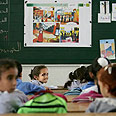
The Arab linguistic crisis
Arab students face greater linguistic challenges than Jews but enjoy fewer funds
When the education minister responded to the low scores achieved by Israeli students in international reading comprehension tests, she noted they stemmed from the low achievements posted by Arab students, while the accomplishments of Hebrew-speaking students were relatively good.
“These tests attest to the fact that we have two vastly different linguistic societies living here…we have a high-level Hebrew society that is in the top 10…yet among Arabic-speakers we see a total crisis in acquiring the language. It is a small comfort to know we are not alone. All Arab countries are below us. The Arabic-speaking world is facing a reading crisis, although this does not exempt us from changing the situation,” the minister said.
The comparison made by the minister between Arab citizens of Israel who failed the tests and the citizens of other countries is puzzling. What are the boundaries of Israeli society? Where does it end, and where does another society begin? What are the boundaries of the responsibilities of the Israeli government and Israeli Education Ministry? The minister’s words reflect an inability to set those boundaries.
Arab societies in the Middle East were never perceived by the Israeli government as worthy for the purpose of comparing achievements, not even as a “small comfort.” Why then are Arab societies suddenly mentioned by Minister Tamir as a comparative element? Is it possible that they were invited into public discussion on a one-time basis in order to enable the education minister to alleviate the shame of the low achievements?
The reading crisis faced by Arab societies is a result of a lack of resources. Arab societies, with the exception of those in the Persian Gulf, suffer from abject poverty. Comparing the Israeli education system to the ones in Arab countries that enjoy much lower budgets is completely irrelevant. It is also false to compare the difficulties of language studies faced by Arabs in Israel and students in Arab countries, because Israeli Arabs are required to also learn Hebrew, unlike their counterparts in Arab countries.
60-year problem
However, the minister was right to mention the special linguistic difficulties faced by Arabs in Israel, who are required to show a double effort compared to Hebrew-speaking students. A Jewish student faces two linguistic challenges: Studying Hebrew and English. An Arab student faced four: In addition to studying Arabic, Hebrew, and English, these students must also learn the differences between spoken and written Arabic.
The real reason for the gap in achievements between Jewish and Arab students has to do with the way the Israeli education system was formed. Under the rule of the British, we had two separate educational systems here: An official national system for the Arabs, and an autonomous one for the Jews. The Arab schools relied on British funds alone and were monitored by British inspectors, while Jewish schools received both British funds as well as donations from Jewish organizations in the West. The supervision they were under was for appearances sake at most.
To this day, we have two separate education systems in practice, and the gaps between them have remained. Arab schools continue to receive fewer funds but are subjected to greater supervision.
The complexity in linguistic studies at Arab schools does not reflect a new situation. The opposite is true: This problem has been there for 60 years. In order to address this reality, the education minister must assume full responsibility for it. Therefore, two actions are required: Designation of more funds to Arab schools, which would allow them to better address linguistic studies, and minimizing supervision, in order to enable Arab experts to lead these schools to meeting the truly important objectives.
Dr. Yoad Eliaz heads Indimage, an organization dedicated to education in mixed cities










